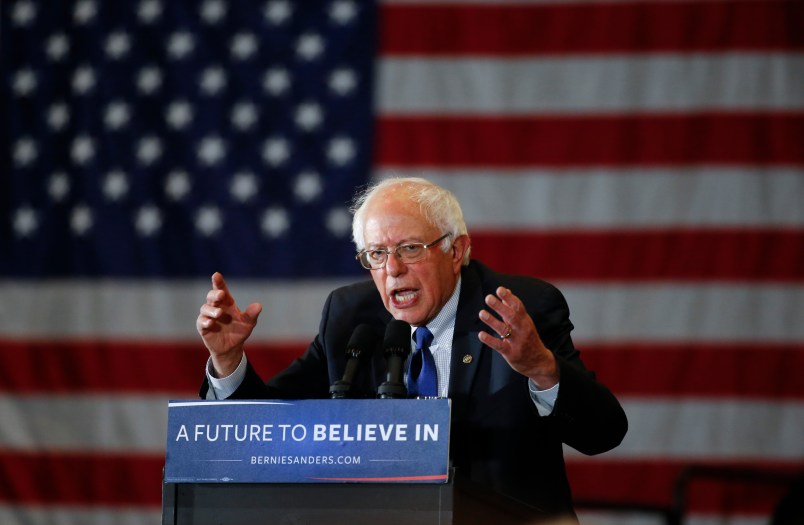Sen. Bernie Sanders (I-VT) struggled to detail how he would break-up the big banks and move toward a “moral economy” during an interview with the New York Daily News editorial board published Monday.
A member of the editorial board asked Sanders what authority he would have as President to break-up banks like JPMorgan Chase and Bank of America.
Sanders answered:
Well, by the way, the idea of breaking up these banks is not an original idea. It’s an idea that some conservatives have also agreed to. You’ve got head of, I think it’s, the Kansas City Fed, some pretty conservative guys, who understands. Let’s talk about the merit of the issue, and then talk about how we get there.
Right now, what you have are two factors. We bailed out Wall Street because the banks are too big to fail, correct? It turns out, that three out of the four largest banks are bigger today than they were when we bailed them out, when they were too-big-to-fail. That’s number one. Number two, if you look at the six largest financial institutions of this country, their assets somewhere around $10 trillion. That is equivalent to 58% of the GDP of America. They issue two-thirds of the credit cards in this country, and about one-third of the mortgages. That is a lot of power. And I think that if somebody, like if Teddy Roosevelt were alive today, he would look at that. Forgetting even the risk element, the bailout element, and just look at the kind of financial power that these guys have, would say that is too much power.
“OK,” an editorial board member responded, according to a Daily News transcript, before pressing Sanders for more specifics about the policy plan.
“How you go about doing it is having legislation passed, or giving the authority to the secretary of treasury to determine, under Dodd-Frank, that these banks are a danger to the economy over the problem of too-big-to-fail,” Sanders said.
If the banks were to be broken up, the editorial board asked, what would happen to the hundreds of thousands of employees who would be affected?
“What I foresee is a stronger national economy. And, in fact, a stronger economy in New York State, as well. What I foresee is a financial system which actually makes affordable loans to small and medium-size businesses,” Sanders responded.
The senator also suggested the Justice Department was not forceful enough in prosecuting Wall Street executives.
“I’m saying, a Sanders administration would have a much more aggressive attorney general looking at all of the legal implications,” he said.
When pressed for specific statutes that could be invoked to bring charges, Sanders couldn’t answer.
“Do I have them in front of me, now, legal statutes? No, I don’t,” he said. “When a company pays a $5 billion fine for doing something that’s illegal, yeah, I think we can bring charges against the executives.”
Read the full conversation here.







Sanders Tax Policy if enacted would reduce nominal GDP growth by at least 1% a year resulting in
1.5 million fewer jobs a year…and I am a life long Democrat…just not a Democratic Socialist…
Well, that was a new response that we never heard…what? you say that Bernie repeats that response literally every time a question about the banks is raised? So it won’t be new when he says it yet again during the NY debate that he cried wasn’t happening, and then when giving a bevy of dates to choose from, tried to weasel out of?
Interesting…in the not very sort of way.
So, a follow up question, Mr. Sanders…in this “moral” economy, will you or won’t you release your complete tax returns for the past 10 years? Too busy still? Or will it still be Jane’s fault?
Is Bernie promising a unicorn without knowing where unicorns come from?
Step 1: Wag finger
Step 2: ???
Step 3: Break up banks
I’m not trying to be mean, but this shouldn’t surprise anyone who’s been paying attention. TBH, that whole interview was just short of a disaster. When asked a question on details in a debate and your stock answer is “political revolution”, it should raise some red flags. The interview reinforced what I think about Bernie Sanders. He’s very good with diagnosing the symptoms of the problems. I think he’s more spotty with the causes of them and is clueless about the processes involved in rectifying. I think it’s best he stays in the Senate.